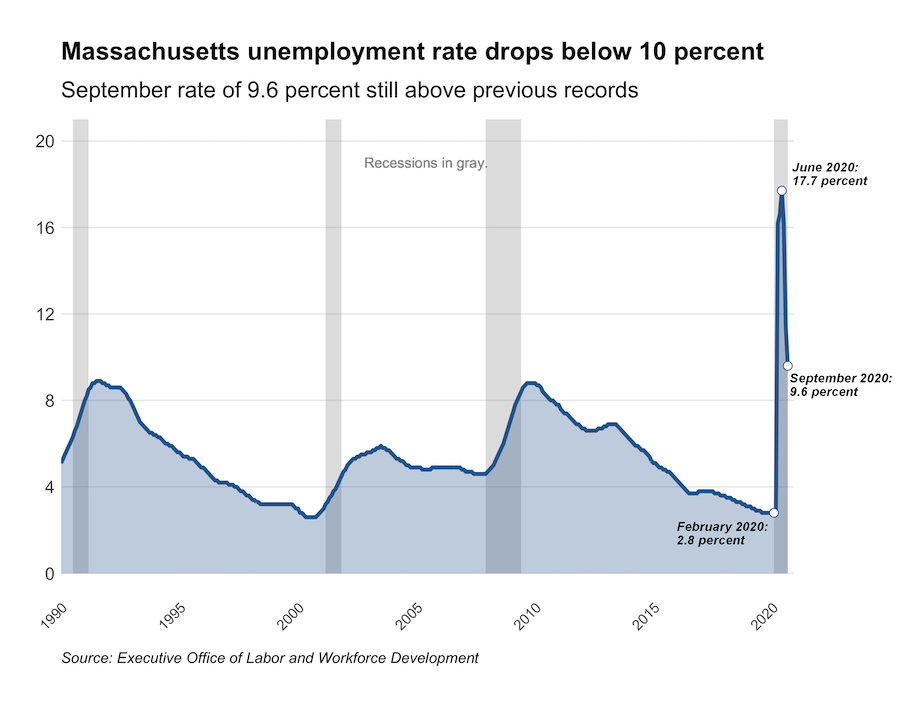Baker Warns: Thanksgiving celebrations carry huge COVID-19 risks
By Katie Lannan
State House News Service
Holidays will need to look different this year, state officials said as they recommended Thanksgiving celebrations be held virtually or limited to one household to minimize COVID-19 transmission risks.
“The science on this one’s pretty clear — gathering in groups indoors for an extended period of time with family and friends is likely the worst possible scenario for spreading the virus,” Gov. Charlie Baker said during an afternoon press conference.
Pointing to rising COVID-19 case numbers among Massachusetts residents under age 30, Baker again said people should stop hosting parties and other large social gatherings. He urged younger people, who may not experience severe symptoms of the respiratory disease, to think about the relatives they might infect, the health care workers gearing up for a second surge, and the children whose ability to attend in-person school hinges on the rate of virus spread.
Baker said his own Thanksgiving celebration this year will be “immediate family, and that’s it,” and said all families should “think long and hard about the well-being of your loved ones before you make your plans.”
For many, a household-only Thanksgiving would represent a smaller get-together than the state’s indoor gathering limit of 25 people or the 10 people allowed to be seated together at a restaurant.
If people do mark the holiday with friends and family outside their household, Baker said, they should limit guests as much as possible, keeping it “to your limited social network, those that you’ve seen on a pretty regular basis.”
Sudders said people should wear masks while together and as they prepare meals, plate each person’s food rather than serving family-style, spend time outside and open doors and windows for ventilation when indoors, and get tested for COVID-19. She said the state is working with testing sites to increase their hours before Thanksgiving.
“There’s just no way around it,” she said. “The holidays need to look and feel very different this year.”
The Department of Public Health suggests keeping visits short and dropping off meals made from traditional family recipes for relatives or neighbors. For those who do plan to celebrate with people they do not live with, the DPH says they should avoid hugging, shaking hands, singing, dancing, shouting or sharing food, and should not gather in-person with older adults, people with certain medical conditions or others at higher risk for severe illness from COVID-19.
The department’s holiday recommendations also include seating people with plenty of space instead of at one large table, minimizing contact with others and trips outside the home for 14 days before and after the celebration, and encouraging guests to bring food and drinks for themselves and their household only.
“If people let their guard down, and they don’t do their part, all that preparation and all that sacrifice that we’ve made to bring our numbers down won’t be sustained,” Baker said. “We can all do our part to stop the spread. It’s the simple things that we have to repeat over and over that are the best weapon we have to slow the spread of COVID. Wherever you are, whoever you’re with, you should wear a face covering, social distance, practice good hygiene. Stay home if you’re sick. Get a test if you think you’ve been exposed, and don’t host or attend gatherings with people who aren’t part of your core network.”
Baker, who reiterated his call for people to avoid indoor Halloween parties this weekend, said contact tracing indicates that more than half of new cases are attributed to social gatherings and household transmission.
“As we head into this holiday season, as we move indoors, as our cases, as we said almost three weeks ago, have continued to climb, use your head and think about how your actions will affect those around you,” he said.
More than 1,000 new COVID-19 cases were logged in Massachusetts each day from Saturday through Tuesday, numbers not previously seen here since May, when the virus trend was on a downward swing from a mid-April surge.
Baker said there has been a “significant increase” in the number of people under age 30 who are testing positive. In April, he said, the under 30 age range represented 15 percent of the COVID-19 caseload, with people over 60 accounting for 42 percent. Now, the under 30 group represents 27 percent of cases, and the over 60 group 18 percent.
“There is a little good news in there,” Baker said. “It means that our most vulnerable residents have seen a significant decrease in their share of new cases, which has much to do with many of the measures that we put in place over the spring and summer.”
Recent data shows about 300 people per day who are under age 30 testing positive, Baker said.
“We get the fact that for many young people, they have mild symptoms or in some cases no symptoms at all,” the governor said. “But their contact, especially close, informal contact indoors over an extended period of time, like watching a football game on a weekend with older people, or those who have other medical conditions, can create terrible circumstances for many of our most vulnerable.”
